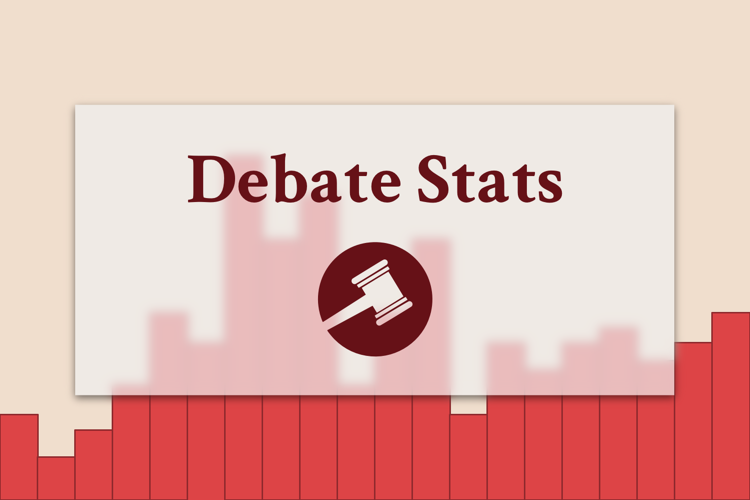No Side Bias Across Berkeley & Harvard Elims

John Scoggin & Bob Overing
Summary
We compiled all available results from Berkeley & Harvard preliminary and elimination rounds. Berkeley prelims averaged 124 rounds for a total sample of 741 prelim rounds. There were 61 elims at Berkeley for a total of 183 possible ballots. Harvard prelims averaged 126 rounds for a total sample of 755 prelim rounds. There were 62 elims at Harvard for a total of 186 possible ballots. Berkeley and Harvard together total 1496 prelim rounds and 123 elim rounds.
Overall, neg won 54.1% of prelim rounds, 49.6% of elim rounds, and 53.8% of all rounds at Berkeley and Harvard. See the round-by-round breakdown and pie charts included below.
Commentary
Debaters have been using several different statistics for measuring side bias over the years. The data can be robust methodologically but still require interpretation, and there’s a lack of discussion on which metrics are best.
We believe elimination rounds at major bid tournaments are the best sample for measuring side bias, and in our survey, neg won only 49.6% of elims at Berkeley and Harvard, indicating little discernible difference between aff and neg win rates.
What we want to know when assessing side bias is what other variables could affect the correlation between side and wins. The elims statistic is better than prelims or elims + prelims because it reduces the effect of other variables. It could be that skill advantages are reflected more strongly when the more skilled debater is neg, and elims closes the skill gap for a better measurement. It could be that negs have an advantage when strategies are suboptimal (e.g. running an old aff as opposed to breaking a new one), which elims reduce by increasing pressure to exercise the best strategic options. Judges may be more likely to vote neg because of lingering paradigmatic views about stock issues or presumption, which could manifest in debates between two less skilled debaters and say more about their lack of skill than about any intrinsic side bias in LD debate. Finally, three judge panels in elims give us more reliable data.
Should we make anything of the difference between Berkeley and Harvard in elims neg win percentage? Probably not. The fact that we see two tournaments with very different side bias statistics indicates that stylistic and strategic differences (such as non-topical affs, more aff tricks, more willingness to vote on topicality or other one-sided arguments) are far more important contributors to winning than side bias. Perhaps elim debaters at Harvard made more appeals to side bias to justify in-round remedies — the large aff win percentage could be evidence for that assertion, but absent disaggregated data that include variables like strategy, 1AR/2AR choices, and argued/won in-round remedies, it would be very difficult to prove. If proven, there would also be a strong overcompensation argument (since Harvard elims went 56.5% aff, not 50/50).
What should we make of the 4% difference in prelims? Not much. Every debater affirms roughly the same number of times she negates. We still might want to correct for a 4% difference in winning percentage, but there should be a strong presumption against in-round remedies that can easily overcompensate. Remedies like giving the aff RVIs, making all aff theory drop the debater, or allowing aff to choose framework or ROB might do much more than 4%; without more robust, specific data, it’s very difficult to know. Given that 4% is small and there are inherent difficulties in measuring the efficacy of various remedies, the initiator should have a strong burden of proof: (1) prove the side bias is significant enough that it requires a remedy, (2) prove there is a remedy that would more evenly balance sides, and (3) prove the remedy makes sense in the current metagame.
Data
Berkeley
R1: Neg Won 36.5%
R2: Neg Won 65.3%
R3: Neg Won 62.2%
R4: Neg Won 55.6%
R5: Neg Won 56%
R6: Neg Won 52.2%
All Prelims: Neg Won 54.7%

Elim Ballots: Neg Won 56.8%
Elim Wins: Neg Won 55.7%

All Prelims & Elims: Neg Won 54.7%
Harvard
R1: Neg Won 52.4%
R2: Neg Won 48.4%
R3: Neg Won 58.4%
R4: Neg Won 54.3%
R5: Neg Won 55.6%
R6: Neg Won 52.8%
All Prelims: Neg Won 53.6%

Elim Ballots: Neg Won 49.5%
Elim Wins: Neg Won 43.5%

All Prelims & Elims: Neg Won 52.9%
Berkeley & Harvard
All Prelims: Neg Won 54.1%

All Elims: Neg Won 49.6%

All Prelim & Elim Rounds: Neg Won 53.8%


